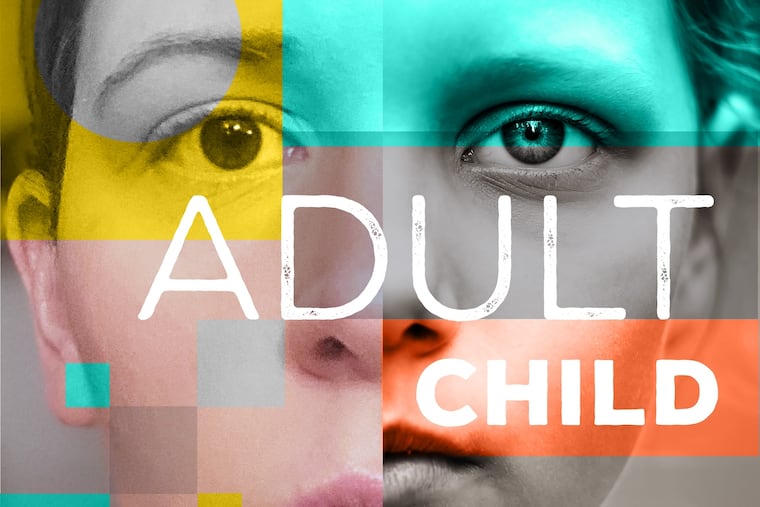A Bryn Mawr native attended half a dozen outpatient rehab programs in the Philadelphia area before she turned 19. She is now 15 years sober
As National Recovery Month comes to a close, we speak to Andrea Ashley, host of the very popular podcast 'Adult Child.'

“My name is Andrea, and I don’t want to be an alcoholic,” Andrea Ashley, 34, the Bryn Mawr native and host of Adult Child — a recovery-themed podcast — recalled saying at her first Alcoholics Anonymous meeting in Narberth, Pa. Back then, Ashley was in sixth grade, supporting her sobriety-seeking parent at the meeting.
Ashley, who’s quick to point out that her initials are “AA” is not just the daughter of an alcoholic, but also the granddaughter and great granddaughter of alcoholics. She didn’t stand a chance of not becoming one herself, she said to The Inquirer in a recent phone interview from her home in Jacksonville, Fla.
Despite her declaration at the AA meeting, by seventh grade Ashley was sliding toward addiction.
Four days after her 14th birthday, Ashley was sent to rehab for alcohol and marijuana abuse. At the Caron Center’s special unit for adolescents, she was assigned to room with an 18-year-old who was going through heroin withdrawal. She remembered crying regularly, feeling scared, and doing whatever she thought the staff at the facility wanted her to do or say. She had, she said, “zero intention of becoming sober.”
After returning home, she continued with a group-therapy style outpatient program in Havertown called Rehab After Work, with other teens who were, Ashley recalled, mostly court ordered to attend.
During the summer between 9th and 10th grade she went to a Rehab After Work outpatient program in Paoli. In 10th grade she spent a little over a semester at a “character building” boarding school in Maine called Hyde School. A short lived attendance at yet another outpatient program followed.
By her senior year at Harriton High School, she was consuming alcohol around the clock. When she was arrested for underage drinking that fall, she lost her license for a month and was required to attend an alcohol education course. Then, with graduation on the horizon, she traveled to yet another outpatient facility, this time in Malvern. Ashley remembers getting high while driving herself there.
After visiting half a dozen outpatient rehab programs in the greater Philadelphia area, and multiple failed attempts at sobriety, Ashley finally took her last drink and drug at 19. (She celebrated her 15th year of sobriety this September.)
In 2018, a short-lived romance with a man called Brian, who also struggled with heavy drinking, sent her into paralyzing depression and anxiety. “I’m glad nobody told me ‘Oh at nine years sober you’re going to be in even more pain than you are right now with one day sober,’ because I don’t know that I would have stayed sober,” she said.
Now she views the pain as a strange gift. After another brief relationship with yet another alcoholic, “Brian Number 2,” led to what she calls her “second great surrender,” she finally came to terms with the impact that her dysfunctional upbringing had on her.
She’s grateful to AA for saving her life, but she realizes her drinking was a symptom of a bigger issue. “The unresolved pain of my childhood was…the reason for all my present day pain (including my broken man picker and dysfunction in relationships),” Ashley explains to listeners in a podcast episode. “I really just view my alcoholism as a symptom of this trauma.”
So Ashley began yet another twelve-step program: Adult Children of Alcoholics and Dysfunctional Families.
While working from home during the pandemic as a recruiter for accounting firms, Ashley set up a recording studio in her closet with the intention of making a podcast that would take a “deep dive into the impact of growing up in a dysfunctional family.”
In March 2021 she launched the first episode of Adult Child. Listeners have downloaded her show 1.5 million times.
While she repeatedly insists that a loving family and a dysfunctional family are not mutually exclusive, her process of understanding and “discarding this faulty programming” has made a “profound” difference in her life.
Over the past two and a half years, she’s recorded hundreds of episodes featuring “vulnerable and filterless conversations” on topics ranging from addiction, codependency, and complex trauma. Ashley’s goal is to convince listeners that, “This sh— didn’t start with you guys,” and that they “aren’t inherently flawed and permanently damaged.”